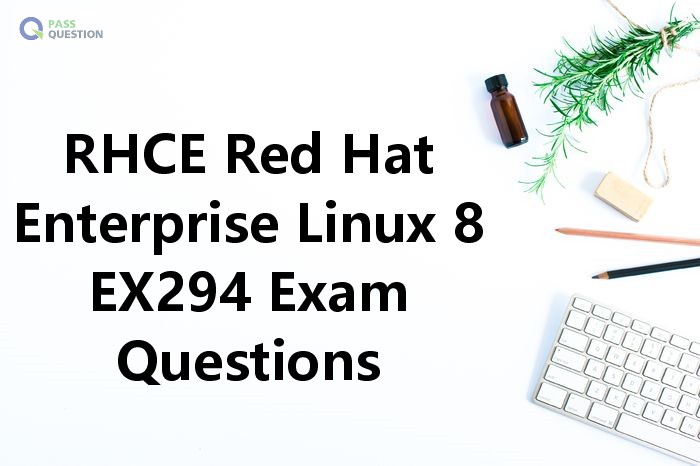RHCE Red Hat Enterprise Linux 8 EX294 Exam Questions
Red Hat Certified Engineer (RHCE) exam for Red Hat Enterprise Linux 8 (EX294) exam is available at PassQuestion, you can get the latest RHCE Red Hat Enterprise Linux 8 EX294 Exam Questions to best prepare for your test,it can give you 100% confidence and make you feel at ease to take the Red Hat EX294 exam. You could go through each and every question and answer given in this format thoroughly and be confident about appearing in your final RHCE8 EX294 exam.

EX294 Exam Description - (RHCE) exam for Red Hat Enterprise Linux 8
The performance-based Red Hat Certified Engineer (RHCE) exam for Red Hat Enterprise Linux 8 (EX294) tests your knowledge and skill in managing multiple systems using Red Hat Ansible Engine and executing common system administration tasks across a number of systems with Ansible. The skills tested in this exam are the foundation for system administration across many Red Hat products.
By passing this exam, you become a Red Hat Certified Engineer. An RHCE is a Red Hat Certified System Administrator (RHCSA) who is ready to use Ansible and scripting to automate Red Hat Enterprise Linux tasks, integrate Red Hat emerging technologies, and apply automation for efficiency and innovation. If you choose to continue your learning journey beyond RHCE, the credential can also serve as a foundational step on your path toward our highest level of certification—Red Hat Certified Architect.
This exam is based on Red Hat Enterprise Linux 8 and Red Hat Ansible Engine 2.8. An RHCE will still be earned by having first passed the Red Hat Certified System Administrator exam (EX200) and then passing an RHCE exam while still current as an RHCSA.
EX294 Exam Topics
Be able to perform all tasks expected of a Red Hat Certified System Administrator
- Understand and use essential tools
- Operate running systems
- Configure local storage
- Create and configure file systems
- Deploy, configure, and maintain systems
- Manage users and groups
- Manage security
Understand core components of Ansible
- Inventories
- Modules
- Variables
- Facts
- Plays
- Playbooks
- Configuration files
- Use provided documentation to look up specific information about Ansible modules and commands
Install and configure an Ansible control node
- Install required packages
- Create a static host inventory file
- Create a configuration file
- Create and use static inventories to define groups of hosts
- Manage parallelism
Configure Ansible managed nodes
- Create and distribute SSH keys to managed nodes
- Configure privilege escalation on managed nodes
- Validate a working configuration using ad hoc Ansible commands
Script administration tasks
- Create simple shell scripts
- Create simple shell scripts that run ad hoc Ansible commands
Create Ansible plays and playbooks
- Know how to work with commonly used Ansible modules
- Use variables to retrieve the results of running a command
- Use conditionals to control play execution
- Configure error handling
- Create playbooks to configure systems to a specified state
Use Ansible modules for system administration tasks that work with:
- Software packages and repositories
- Services
- Firewall rules
- File systems
- Storage devices
- File content
- Archiving
- Scheduled tasks
- Security
- Users and groups
Work with roles
- Create roles
- Download roles from an Ansible Galaxy and use them
Use advanced Ansible features
- Create and use templates to create customized configuration files
- Use Ansible Vault in playbooks to protect sensitive data
- TOP 50 Exam Questions
-
Exam
All copyrights reserved 2025 PassQuestion NETWORK CO.,LIMITED. All Rights Reserved.

